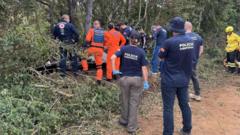A significant power outage affected lives across the Iberian Peninsula, leaving millions without electricity and prompting investigations into the cause, with officials denying a cyberattack.**
Widespread Power Outages Disrupt Daily Life Across Iberian Peninsula**

Widespread Power Outages Disrupt Daily Life Across Iberian Peninsula**
Millions face extended blackouts in Spain and Portugal; inquiries into the cause are ongoing.**
With millions affected by a substantial power outage on Monday, daily life in Spain and Portugal was dramatically altered. Areas began experiencing power cuts in the afternoon, leading to chaos as traffic lights went dark, public transport ground to a halt, and essential services struggled to cope.
The outages impacted major urban centers, causing long lines at grocery stores and ATMs, with cash transactions becoming the only viable option as credit card systems failed. In cities like Ronda, citizens adapted by lighting candles, as restaurants and cafes deliberated on how to continue service without power.
Governments in both countries are actively looking into the cause of these widespread outages. Spanish Prime Minister Pedro Sánchez confirmed that a thorough investigation is underway, while Portugal's energy provider E-Redes indicated a troubling issue with the European electricity grid. Senior officials from Portugal insisted there was no indication of a cyberattack, quelling fears raised by some sectors. Furthermore, REN, a key player in Portuguese electricity supply, dismissed rumors of an atmospheric phenomenon as the outage's root cause.
The consequences of the outages extended beyond mere inconvenience, affecting hospitals, banks, and internet connectivity. Both governmental and emergency services urged the public to limit the use of mobile phones to preserve battery life and facilitate communication in critical situations. As businesses, families, and individuals assess the fallout from this unprecedented event, questions remain as to when normalcy will be restored to the region.
The outages impacted major urban centers, causing long lines at grocery stores and ATMs, with cash transactions becoming the only viable option as credit card systems failed. In cities like Ronda, citizens adapted by lighting candles, as restaurants and cafes deliberated on how to continue service without power.
Governments in both countries are actively looking into the cause of these widespread outages. Spanish Prime Minister Pedro Sánchez confirmed that a thorough investigation is underway, while Portugal's energy provider E-Redes indicated a troubling issue with the European electricity grid. Senior officials from Portugal insisted there was no indication of a cyberattack, quelling fears raised by some sectors. Furthermore, REN, a key player in Portuguese electricity supply, dismissed rumors of an atmospheric phenomenon as the outage's root cause.
The consequences of the outages extended beyond mere inconvenience, affecting hospitals, banks, and internet connectivity. Both governmental and emergency services urged the public to limit the use of mobile phones to preserve battery life and facilitate communication in critical situations. As businesses, families, and individuals assess the fallout from this unprecedented event, questions remain as to when normalcy will be restored to the region.





















